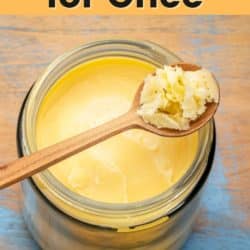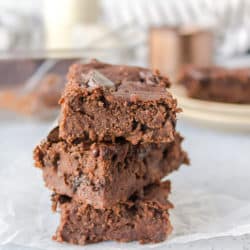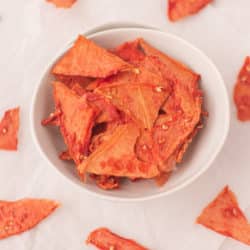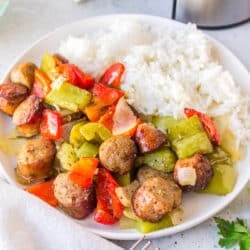7 Substitutes for Ghee in Cooking (Dairy-Free Options)
Ghee is a wonderful cooking fat, but it can be expensive and hard to find. If you’re looking for a substitute for ghee in your recipes, this article includes seven excellent alternatives including avocado oil, olive oil, sesame oil, and more. I’ve included both vegan and non-vegan options.
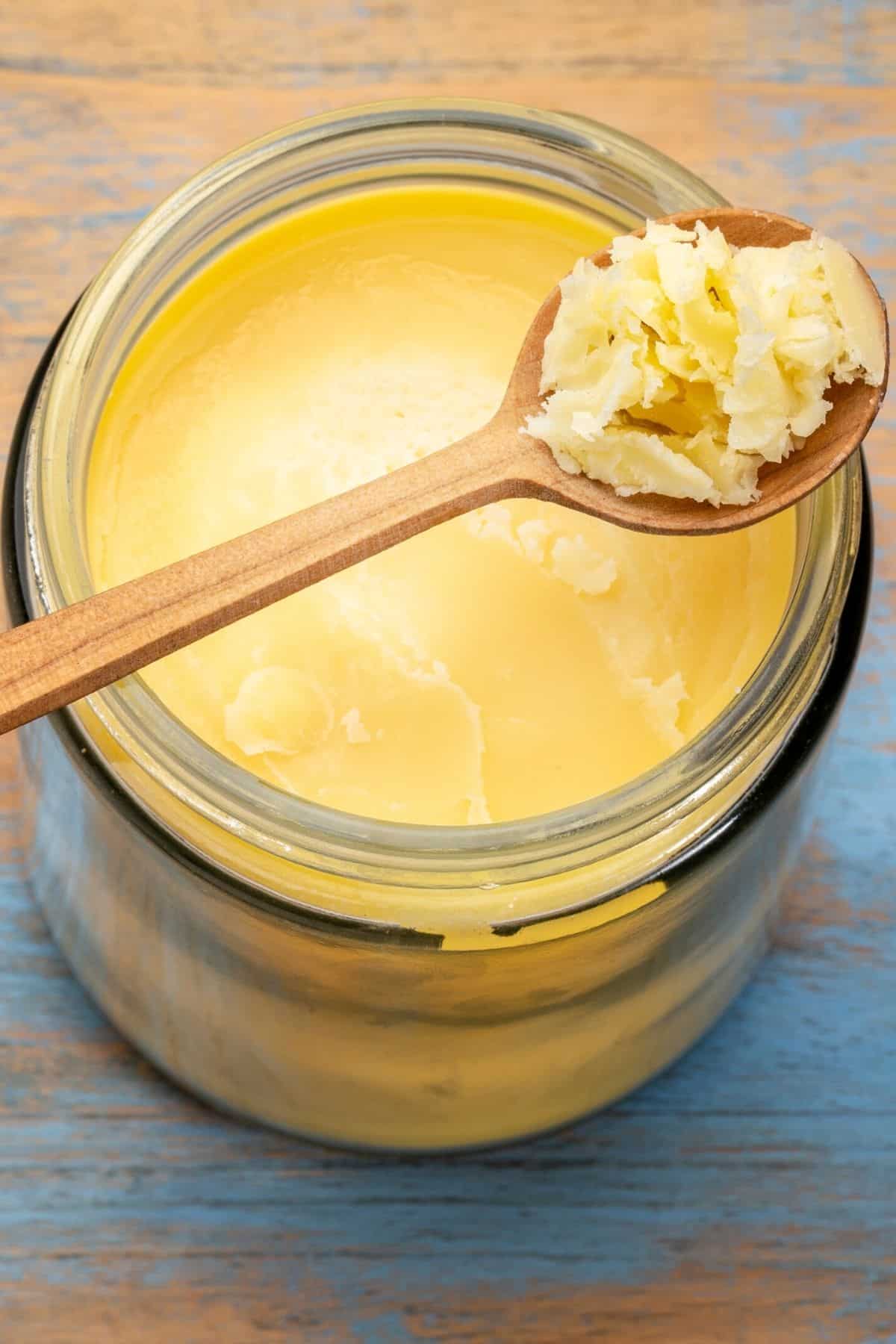
Ghee is highly clarified butter made from cow’s milk, produced using an Indian technique. Indeed, the word “ghee” is Hindi for “fat.”
The start of the clarifying process is the same as with the French technique. This is where the milk solids and butterfat in regular butter are separated and the water is cooked out.
But the Indian technique goes one step further, simmering the milk solids for a while until they become slightly caramelized before straining. This extra step gives ghee a delicious, nutty flavor and a deeper color than butter.
Look for ghee in most grocery stores.
How it’s used
Ghee has been an important part of East Asian and Indian cooking for many years because of its rich flavor. But there are other advantages to using ghee too.
Because it does not contain water, it has a higher smoke point than butter – 485º F for ghee compared to 350º F for butter.
When it comes to cooking, a high smoke point is a good thing. When oils and fats are heated above their smoke points, they can impart a burnt flavor to foods. Exceeding the smoke point may also lead to the formation of carcinogens (see my related article on the healthiest cooking oils).
Because the smoke point of ghee is so high, it is suitable for high-heat cooking like sauteing and frying.
In addition, the clarifying process makes ghee shelf-stable, so it can stay at room temperature and doesn’t have to be stored in the fridge. It also reduces its lactose content, although it’s important to note that it is not completely lactose-free.
Substitutes for Ghee
Because of the way it is made, ghee is pretty expensive. It also contains dairy, so it may be unsuitable for someone with lactose intolerance or following a plant-based diet.
Whether these are the reasons you need a substitute for ghee – or you simply don’t have any to hand – the good news is that there are plenty of good alternatives. What’s more, these are all ingredients that you are likely to already have at home!
1. Avocado Oil
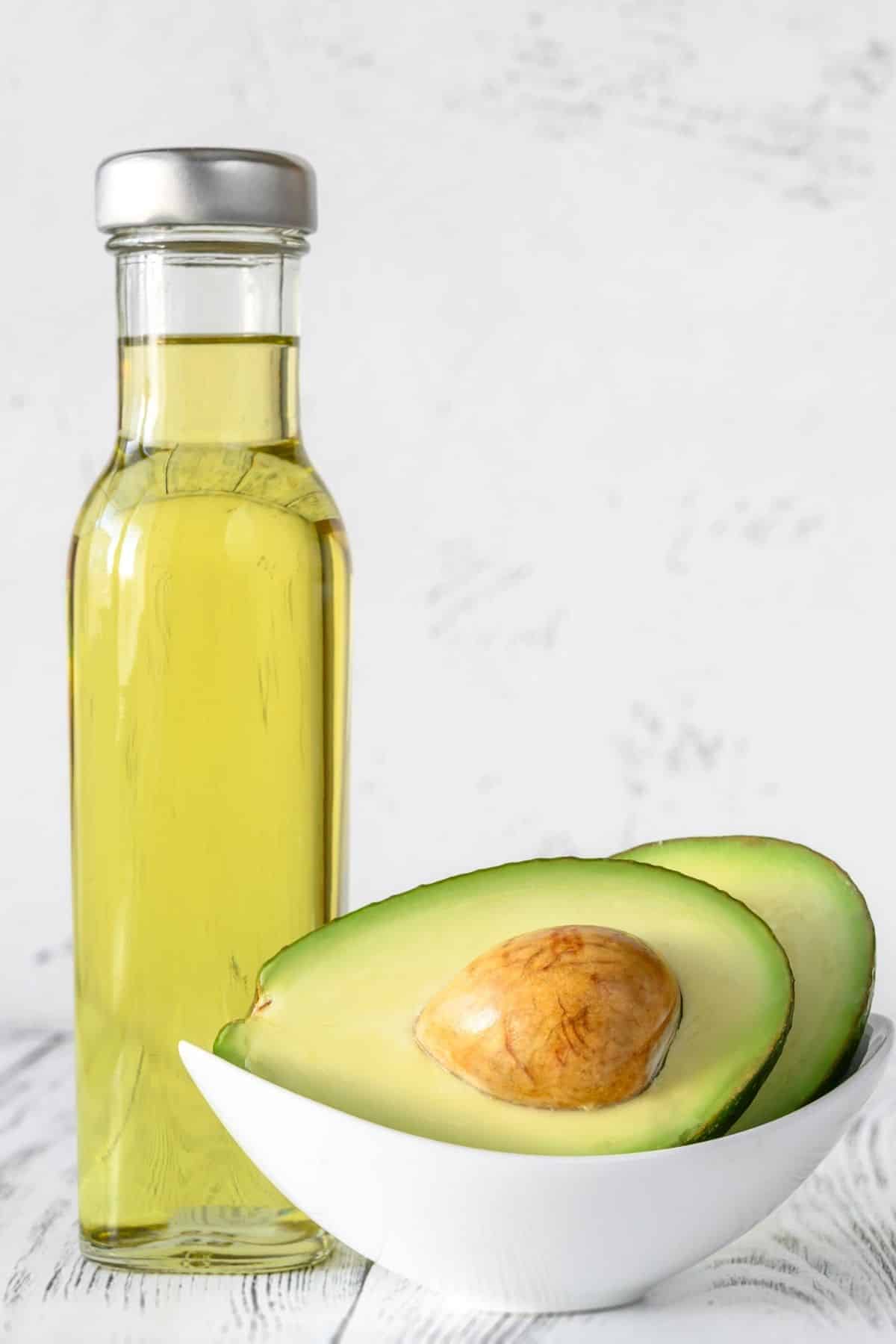
Another simple ghee substitute, avocado oil is a safe and available cooking oil.
While it has a similar smoke point to ghee and is ideal for high-heat cooking, it has very little flavor. If you are preparing a recipe where the flavor of the ghee is important, I would recommend mixing a little butter with the avocado oil (do not do this if you are looking for a vegan ghee alternative or be sure to use vegan butter).
I wouldn’t recommend avocado oil as a substitute for ghee or butter in baked goods, as it tends to produce slightly denser results.
For every 1 cup of ghee use 3/4 cup of avocado oil.
2. Olive Oil
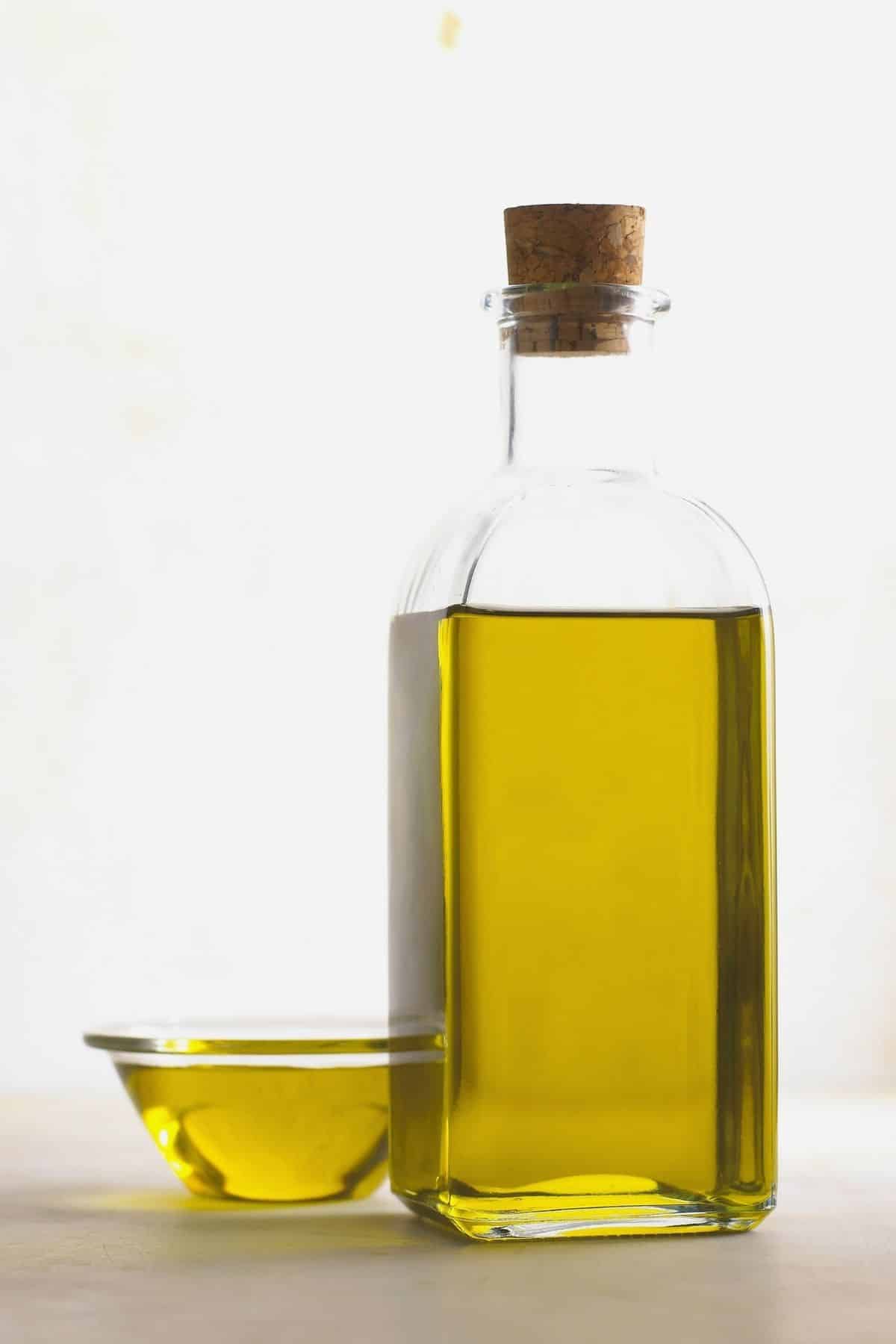
Olive oil makes an interesting alternative to ghee. It is darker in color – particularly if you use extra virgin olive oil – but, like ghee, it is rich and aromatic. Research has also shown it to be one of the healthiest oils around!
You can use it as a replacement for ghee in recipes where a nutty flavor profile is required and it is good for salad dressings, pan-frying, and stir-frying.
You can also use it for baked goods like cookies or brownies, although it doesn’t work well in cakes as it can give them a heavy texture.
For every 1 cup of ghee use 3/4 cup of olive oil.
3. Coconut oil
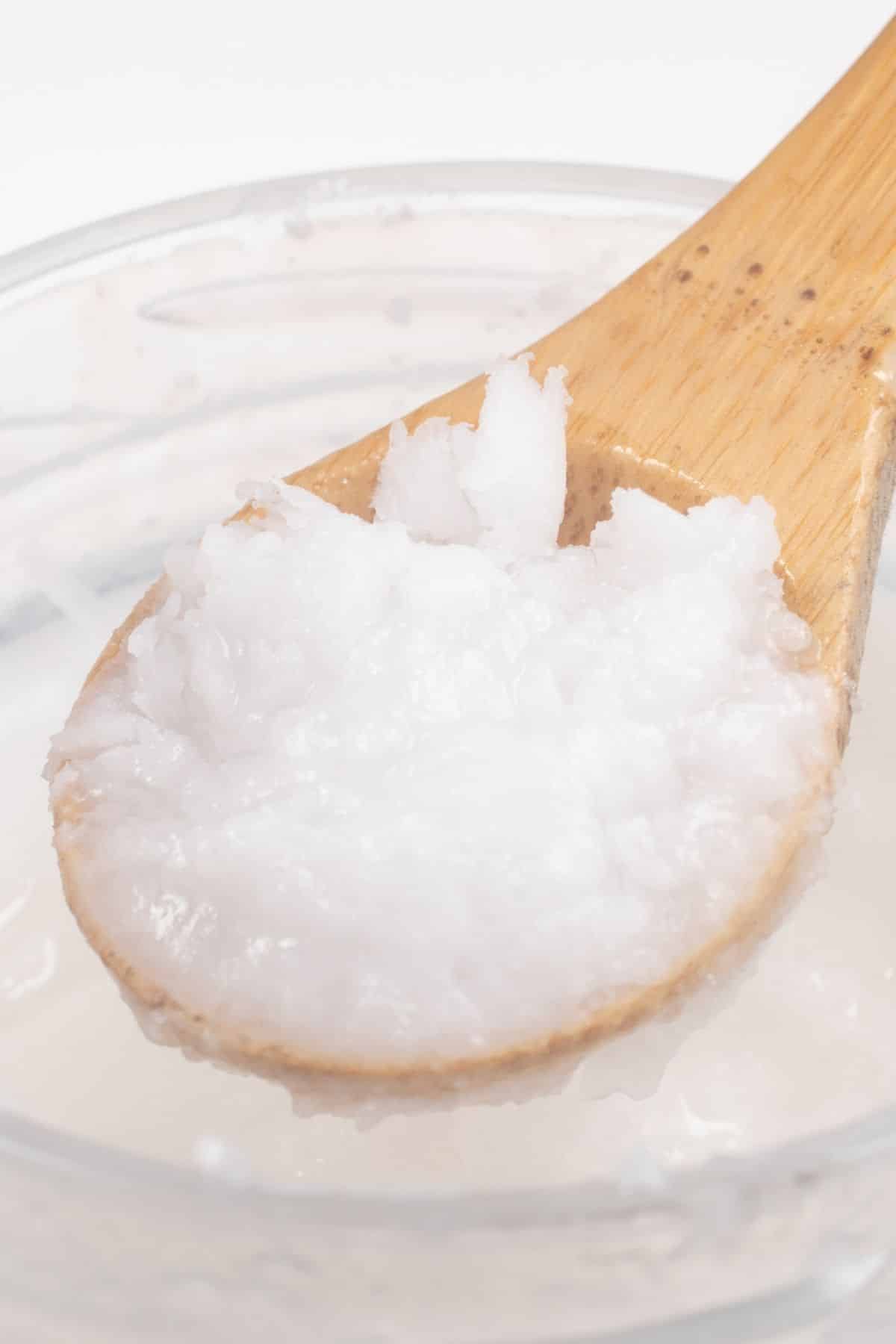
Coconut oil has a very similar structure to ghee and comes in two varieties – refined and unrefined. Unrefined is the tastiest and has quite a strong flavor of coconut. It is very good for baked goods and adds an interesting element to desserts in particular!
Coconut oil is probably my favorite best ghee substitute but it’s great for those of us who need to avoid dairy products.
Refined coconut oil has a higher smoking point than unrefined and is the better choice for frying or cooking at higher temperatures.
For every 1 cup of ghee use 1 cup of coconut oil.
4. Sesame Oil
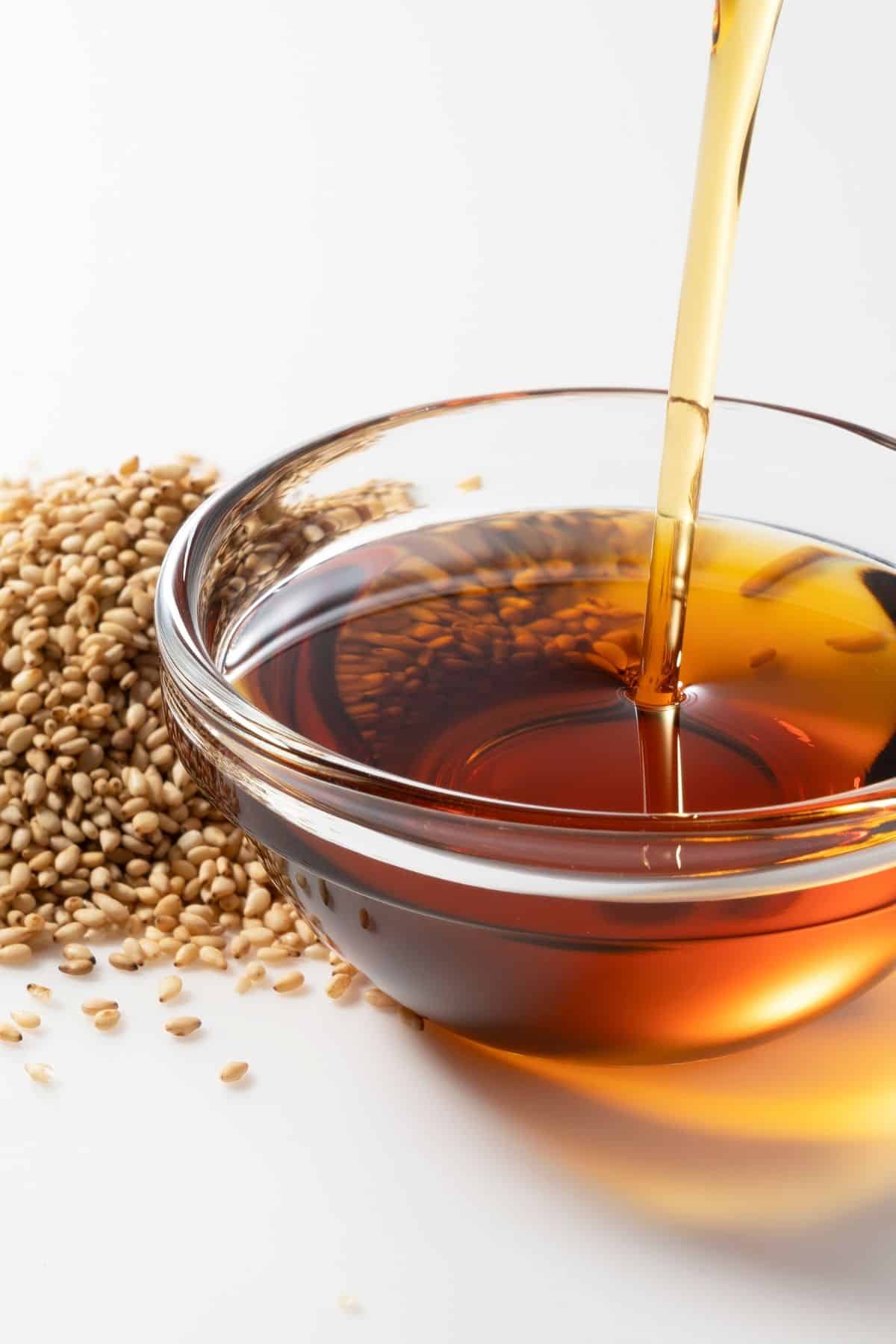
Sesame oil is another flavorsome oil that makes a good substitute for ghee. It is rich in antioxidants and has been shown to have anti-inflammatory properties.
It is also a good source of omega 6 fatty acids.
There are a few varieties of sesame oil, including cold-pressed, light, and toasted. The toasting process gives the sesame seeds quite an intense, nutty flavor, so toasted sesame oil is probably the best one to choose for dishes where the flavor is important.
Since it has a high smoking point, you can use sesame oil for everything from sauteing to roasting. It also makes a delicious finishing oil for noodles, Indian cuisine, rice dishes, and salads.
For every 1 cup of ghee use 3/4 cup of sesame oil.
5. Butter
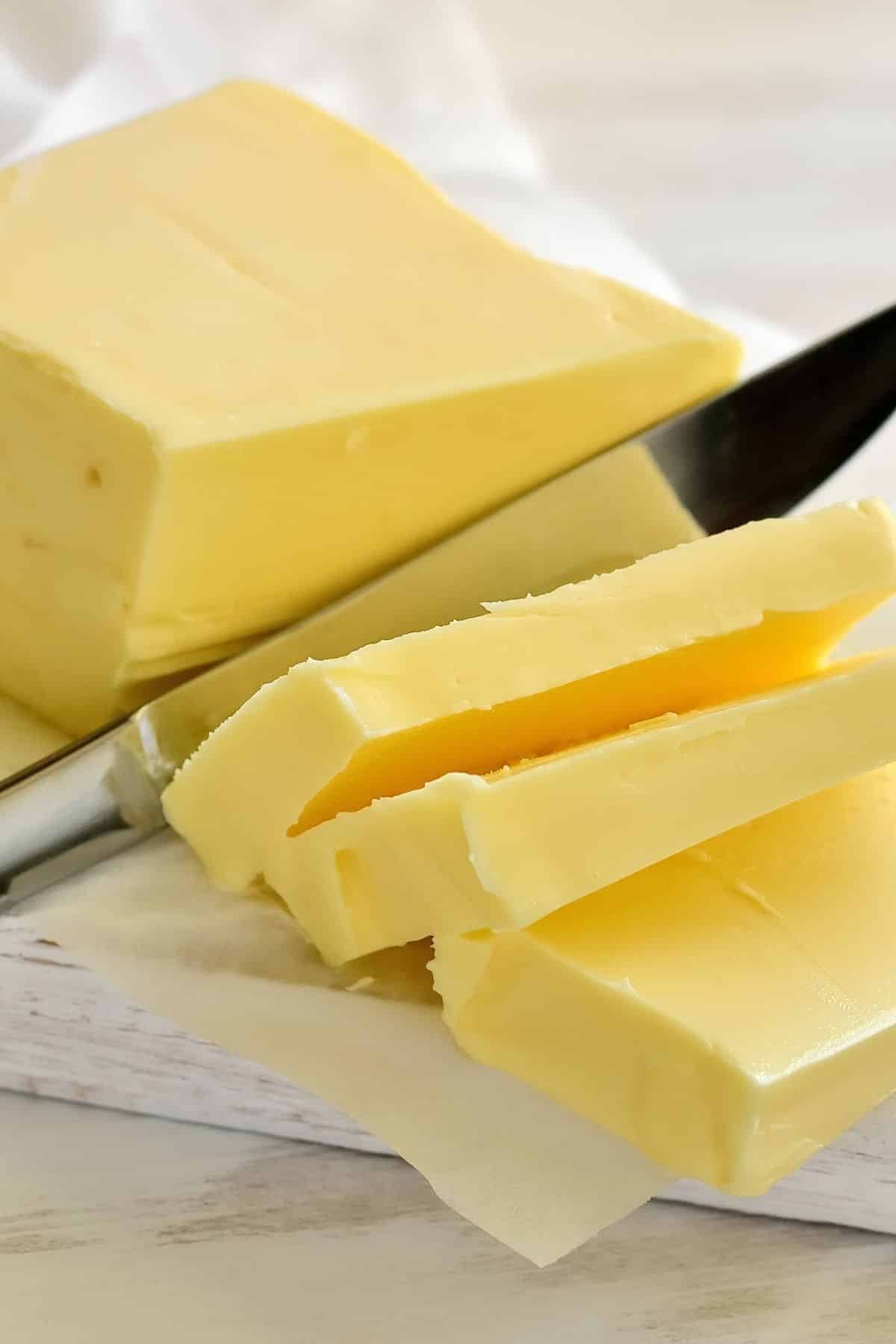
As the basis for ghee, butter is a natural alternative and works particularly well in baked goods!
But it is important to remember that it has a much lower smoking point. Mixing butter with olive oil can help prevent burning your food, while still ensuring the flavor is rich and nutty.
Butter is probably the best alternative for butter assuming you can use animal products.
For every 1 cup of ghee use 1 cup of butter.
6. Sunflower Oil
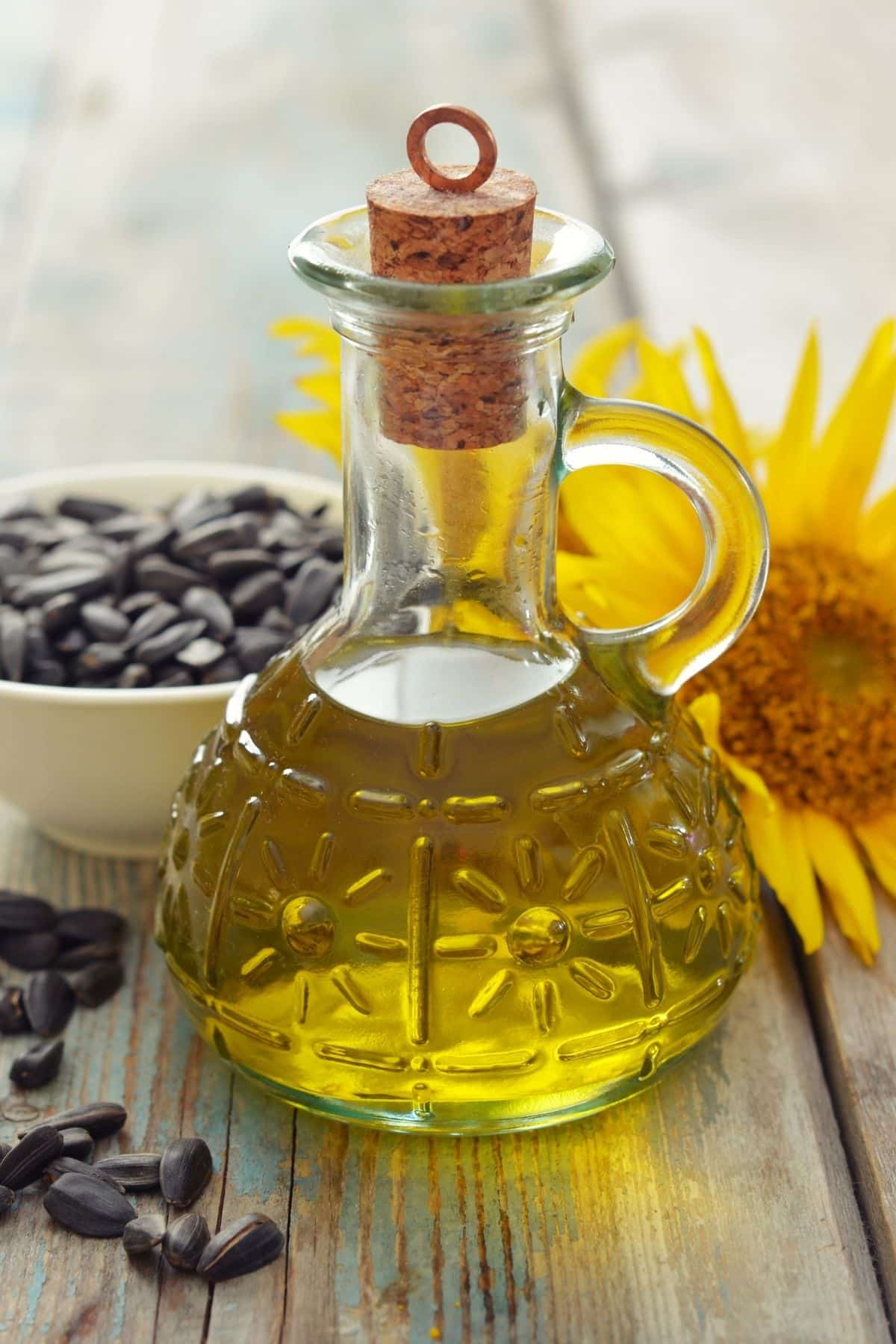
Just like ghee, sunflower oil has a high smoking point of 450º F. This means you can confidently use it for deep-frying, pan-frying, and stir-fries. It is also aromatic, with a slightly nutty flavor, so you can use it for dressings, too.
Sunflower oil has a neutral flavor although some people may avoid it for dietary reasons. I prefer sunflower oil over canola oil which also has potential health issues.
For every 1 cup of ghee use 3/4 cup of sunflower oil.
Pros and Cons of Ghee Alternatives
Here’s a short summary of the pros and cons of substituting ghee in your baking or cooking recipes.
| Substitute | Pros | Cons |
|---|---|---|
| Avocado Oil | High smoke point, ideal for high-heat cooking. | Little flavor; not suitable for baking as it can make baked goods denser. |
| Olive Oil | Rich, aromatic, good for dressings and pan-frying. | Not ideal for cakes due to heavy texture; has a distinct flavor. |
| Coconut Oil | Good for baking and desserts, especially unrefined type. | Strong coconut flavor may not be desired in all dishes. |
| Sesame Oil | High in antioxidants, rich flavor, good for sautéing and as a finishing oil. | Intense flavor from toasted variety might overpower mild dishes. |
| Butter | Natural alternative, excellent in baked goods. | Lower smoke point can lead to burning if not careful. |
| Sunflower Oil | High smoke point, slightly nutty flavor suitable for various cooking methods. | Flavor might not be as rich as ghee for some applications. |
Is Ghee Healthier than Butter?
Although you will often read that ghee is a healthier alternative to butter, experts agree that this isn’t really the case.
Both ghee and butter contain roughly the same amount of fat and calories and share very similar nutritional profiles. Both are free of trans fats, which are the unhealthy hydrogenated oils that you tend to find in processed foods like cakes and cookies.
The main benefits of ghee over butter in terms of health are the higher smoke point and the slightly reduced lactose levels, which may make ghee better tolerated by people sensitive to dairy (see my related post on the reasons to go on a dairy-free diet).
Uses for Ghee
Ghee can be used just like any cooking fat and is a great choice for high-heat cooking. It is also a good alternative to coconut or vegetable oil in baked goods. Because it has such a rich flavor, it is an excellent finishing oil too!
Here are some great ideas for using ghee:
- Drizzle it over cooked vegetables before serving (or use it to make ghee-roasted vegetables)
- Pour melted ghee over your popcorn
- Use it as an alternative to butter in your mashed potatoes
- Spread it on a piece of toast
Homemade Ghee
It’s not too difficult to make your own ghee, and if it’s an ingredient that you use often then you might find the homemade version a cheaper option.
Just simmer a block of butter in a saucepan very gently until it separates and the milk solids sink to the bottom. Continue to cook very gently until the milk solids turn golden in color, skimming off the foam that rises to the top. For a pound of butter, this can take around 30 to 45 minutes.
Strain the liquid through a fine-mesh strainer. You should now be left with the ghee, which will be gold in color. For the very best results, start with a good quality unsalted butter made from the milk of grass-fed cows.
And, of course, you can use homemade ghee in the same ratio of regular ghee when cooking or baking.
Conclusions
Fortunately, there are plenty of ingredients you can use in place of ghee, some with their own unique health benefits! I hope this guide has helped you find a suitable substitute to use in your recipe and that you enjoy any subtle but delicious differences to your finished dish.
Don’t forget to join my newsletter list to get exclusive clean eating recipes and tips. The newsletter is 100% free with no spam; unsubscribe anytime.
About the Author: Carrie Forrest has a master’s degree in public health with a specialty in nutrition and is a certified holistic nutritionist. She is a top wellness and food blogger with over 5 million annual visitors to her site. Carrie has an incredible story of recovery from chronic illness and is passionate about helping other women transform their health. Send her a message through her contact form.
Note: this post is for informational purposes only and is not intended as medical advice. Please consult your healthcare provider for recommendations related to your individual situation.


